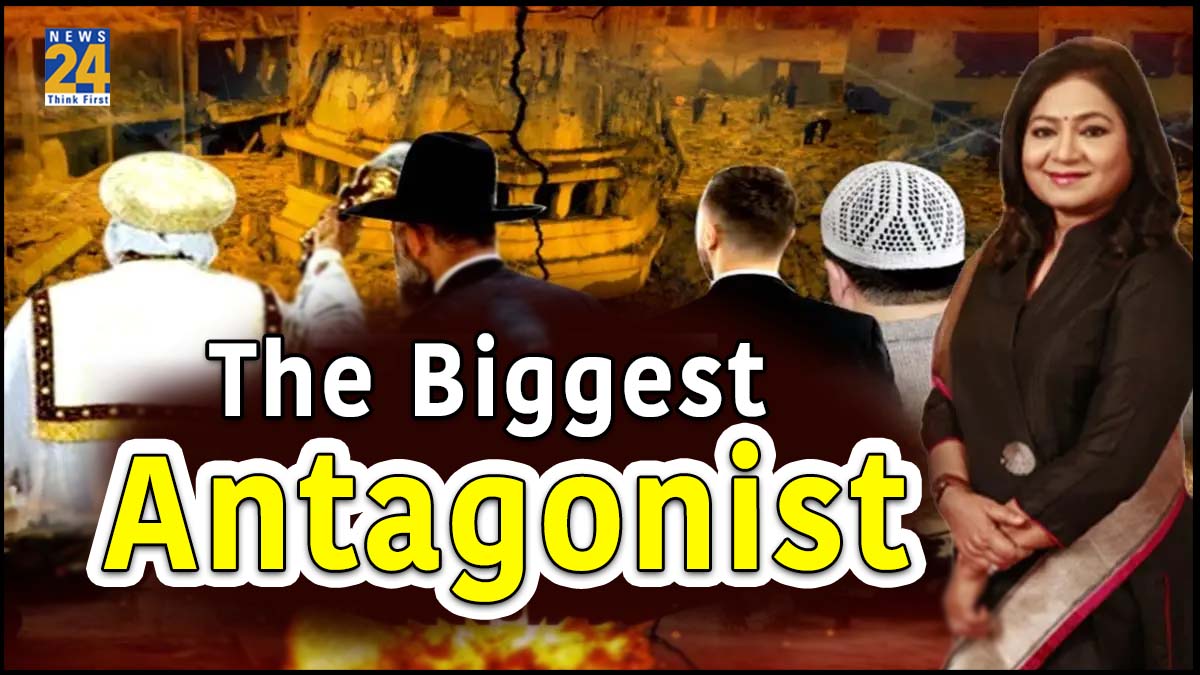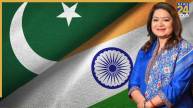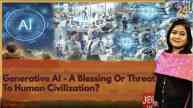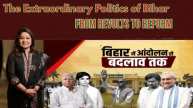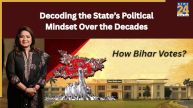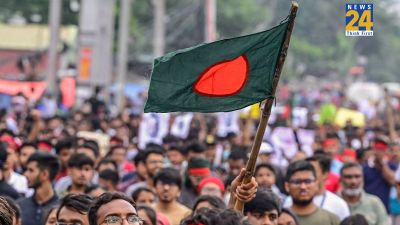– Anurradha Prasad
(CMD and Editor-in-Chief, News24)
Bharat Ek Soch: A week ago, the Hamas group in Palestine’s Gaza launched a fierce assault on Israel with full force. Now, Israel is exacting its revenge.
In the entire world, there is a strange fear. It’s perplexing, with countless questions about the future. The reason behind this is the fierce war ongoing between Hamas and Israel. Just a week ago, the Hamas group in Palestine launched a vigorous assault on Israel with full force. Now, Israel is retaliating. While Gaza, under the influence of Hamas, is bearing the brunt, a significant question remains: What is the root cause of the conflict between Israel and Hamas? Is it a territorial dispute? Is it a collision of two faiths? Is it a clash of civilizations? Who has claimed whose land in the end?
How is the connection established between the 35 acres of land in Jerusalem and the three influential religions in the world? Who sowed the seeds of discord throughout the Arab world? How did geopolitical powers divide the Arab world amongst themselves for their benefit? These questions will attempt to find answers by exploring the boundaries, the development of civilizations, the threads of religion that connect people, and the pursuit of new business paths, as the world remains tangled and unraveled.
The Biggest ‘Villain’
Nearly 27 years ago, a book was published in America with the title “The Clash of Civilizations and the Remaking of World Order,” and the world began debating the predictions made in it. Most political pundits at that time described the clash of civilizations as a frightening concept. Samuel P. Huntington, who introduced the idea, stated that in the coming 21st century, the world would witness conflicts rooted in clashes between civilizations and cultures, which went far deeper than just territorial disputes.
In the 20th century, most conflicts were fought in the name of ideologies like Communism, Fascism, Nazism, or for economic interests. However, consider the wars of the 21st century, such as the Iraq War, the Afghanistan War, the Azerbaijan-Armenia War, the Russia-Ukraine War, and the Israel-Palestine conflict. What is the underlying cause? Why did Syrian cities change hands and become cemeteries? It’s not merely a struggle for land. The roots of these conflicts run much deeper, entwined with religious and cultural narratives.
The History of Judaism, an Ancient Religion
Judaism is considered to be nearly 3,000 years old. Later, Christianity and Islam emerged from the same tradition. To understand the turmoil in the Arab world, one must go back to a time when a struggle for supremacy raged between the Roman and Persian empires. For nearly seven centuries, there was a struggle for dominance between these two empires, one extending from the Persian Gulf and the other from the Red Sea. Both empires had vital trade routes, but due to the conflict, the route through the Persian Gulf was severely affected. In these times, significant tribal societies existed in much of the Arab world, where conflict, fighting, and warfare were a way of life.
In the 7th century, Prophet Muhammad united these tribal communities under the banner of Islam, and he himself engaged in several battles. Possibly during the same era, the fusion of religious and political power took place. A strong current of Islam emerged, and within a mere 100 years of the death of Prophet Muhammad, Islam had become the dominant religion in the Arab world.
At that time, America was not known on the world map. In the 16th century, the flag of Islam was flying high in a significant portion of the world. The Ottoman Empire was expanding its boundaries at an unprecedented rate. The world was roughly divided into four parts: the Islamic, Chinese, British, and other European empires. The Ottoman Empire’s rapid expansion put tremendous pressure on European powers. Historians often view the struggle between Islam and Christianity as a challenge during that period. It was an era of geopolitical shifts, and the rise of the Ottoman Empire created a make-or-break situation for European countries.
In this scenario, many countries that are now prominent on the European map began their efforts to find new trade routes. Christopher Columbus set sail to discover India but found America instead.
The Portuguese navigator Vasco da Gama reached Calicut in Kerala with his ship, initiating a quest for business and substantial profits. This journey kickstarted a process in which European countries, including Britain, Spain, France, and Portugal, began to establish their colonial empires around the world. In this process, upstarts emerged in Europe who would dominate the world. It is in this context that historians see the emergence of Islam as a challenge to Christianity during a specific period. As the Ottoman Empire’s borders began to contract, its image became that of “The Sick Man of Europe.”
The beginning of the 20th century witnessed significant upheaval. The Jews had long been advocating for a separate homeland. During World War I, there was an agreement between Britain and the Jews, known as the Balfour Declaration. It was decided that if Britain defeated the Ottoman Empire in the war, a separate country for Jews would be established in the Palestine region. Consequently, Jews started buying land in Palestine and began settling there rapidly. However, later, Britain reneged on its promise.
After the war, European powers found opportunities to play in the Arab region. Russia agreed to hand over Constantinople, which is now Istanbul, and its surrounding areas, to provide a clear route to the Black Sea. France aimed to strengthen its presence in Syria through economic investments, while Britain chose the path through the Suez Canal and the Persian Gulf to ease its access to India. The Sykes-Picot Agreement was prepared to fulfill the needs of these colonial powers, using the Arab region as a pawn.
Amidst conflicts and religious beliefs, the early 20th century witnessed a significant shift, advocating for women’s rights equal to men’s rights. The end of the Ottoman Empire marked the decline of the last Islamic Caliphate. Turkey was on a new path, led by the revolutionary young leader Mustafa Kemal Atatürk, who, in 1926, abolished Islamic Sharia and implemented secular laws, granting women equal rights with men. The veil, previously mandatory, was banned, and Turkey adopted a Latin script instead of the Arabic script. The Middle Eastern oil wealth, buried in the region’s soil, gained tremendous importance. These countries had the raw resource of oil, but they lacked the technology to extract it or the market for consumption. After World War II, the United States emerged as a major superpower and began to play its cards in the Arab world, taking into account its interests.
The future of the Israel-Palestine conflict is challenging to predict. Over the past six decades, Russia and Ukraine have been engaged in warfare, and it is not clear who is supporting whom or who benefits from the conflict. Similarly, the outcome of the conflict between Hamas and Israel is uncertain. It is difficult to foresee who is directly or indirectly influencing it. History bears witness to how Western powers have tried to change the balance of power in the Arab world during times of conflict. Those who refused to comply with Western interests were eventually removed from power. Whether it was Saddam Hussein in Iraq, Muammar Gaddafi in Libya, or Hosni Mubarak in Egypt, once they no longer served Western interests, they were toppled. The recent withdrawal of the United States from Afghanistan is a fresh example of how it leaves a country as soon as its objectives are met, regardless of the consequences. This raises the question of what might happen with Israel and Palestine. There is also the possibility that continuous disillusionment with America in the Muslim world is taking place. Formerly, Saudi Arabia, a close ally of the United States, is now getting closer to China. Iran and China have improved their chemistry. Fierce rivals like Saudi Arabia and Iran have begun to cooperate. Even the Taliban, who now control Afghanistan, are striking deals with China. In such a context, the United States might be worried that China could replace it in the Arab world. Major powers may be carefully considering their options amidst the escalating flames of the Israel-Palestine conflict and exploring new scenarios.

